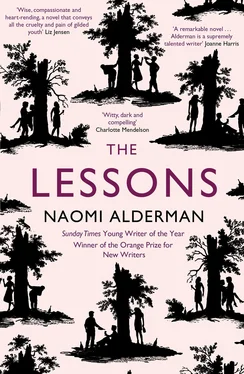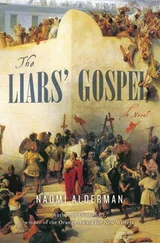10 Second year, January, first week of term
‘I think,’ said Dr Boycott, ‘that for you, Mr Stieff, we must begin to use the stick, in addition to the carrot, wouldn’t you agree, Dr Strong?’
Dr Strong nodded his stern confirmation.
‘It pains us to do this, of course,’ said Dr Boycott, ‘but I cannot see that you have left us much choice. These results —’ he waved his hand at my collection papers on the table in front of him — ‘what have you been doing with your time, Mr Stieff? What? Did you spend the whole of Michaelmas term in a daze?’
I had, in fact, spent most of the previous term in a state of confusion, panic about money and sexual jealousy, but I couldn’t see that telling Boycott this would do any good.
‘We cannot allow this to continue, you must understand. You risk exposing the good name of Gloucester College physics to ridicule. Yours is the accusing finger which wields the dagger thrusting at our soft underbelly to stab us in the back!’
‘I’m sorry, Dr Boycott, I … I’m sorry, I had a bad term.’
‘You did indeed, Mr Stieff. And if you repeat this performance in your examinations you will take a bad degree, if any degree at all. Tell me, are you thinking of continuing to the fourth year?’
Almost everyone took the optional fourth year to get the MSc in physics. I’d intended to take it when I began the course. But now the idea of staying on in Oxford after Mark, Jess and the others had left did not entice me. I hadn’t discussed this with my parents; in fact I’d spent most of the Christmas break either in Annulet House or with Jess’s family.
‘I …’ I paused. The circle of my little universe halted too. The plans my parents and I had made together were clear; with a single word I could commit myself to them. Give me a single word and I can move the earth. ‘I think … not,’ I said. ‘It wouldn’t be a good use of my time. My girlfriend and I are planning to move to London when she finishes her degree — she’s a musician.’
Dr Boycott looked bored. It occurred to me that my personal plans mattered not at all to him and this realization, instead of cowing me, made me unafraid.
‘Yes, you see, Dr Strong,’ I continued, ‘you see, my girlfriend and I plan to move in together in London. I’m going to teach. Secondary school, that is, probably maths. The hours will combine well with her career.’
We had not, in fact, firmly committed to this plan but every day made me surer that I did not want to take Simon’s route, of milk-round jobs or a City career, and I was unsuited to Jess’s vocation or Franny’s academic path. It seemed as good a time as any to take a stand.
‘A … secondary school teacher. That’s certainly —’ Dr Boycott gave a lizard-like blink — ‘commendable. Nonetheless, you will be fit for nothing at all if you cannot achieve a degree. You will take penal collections in four weeks’ time on last term’s work. You understand, Mr Stieff? You must repeat the examinations which you have just failed so abominably. If you do not pass them on your second attempt, we will be forced to consider your place here.’
It was Mark’s twenty-first birthday in the third week of that term. He was a year older than most of us, though he did not advertise this fact, nor did he have any exotic stories of housebuilding in rural Ghana or backpacking across south-east Asia like those who had taken a formal gap year. When asked about the missing year, Mark sometimes said that, with the variety of tutors and stop-gap education he’d had after his parents divorced and his mother took him out of Ampleforth, he’d simply fallen a year behind, and sometimes that he had been ill. I wondered if those few words he’d spoken to me regarding his ‘breakdown’ were the answer to his missing year, but I had not asked.
In any case, he didn’t mark his birthday with any particularly debauched revelry. The most noteworthy event was that Mark received a gift from his father. It startles me now to realize that I never exchanged a word in person with Mark’s father. Mark spent the summers at his father’s house in the north or travelling when he could not bear to see his mother, but his father never came to Annulet House to see us, only ever arriving when Mark was alone. If it were not for the newspaper profiles of the elderly Sir Mewan Winters, of Winters Industrial, or the eventual obituaries, or the car, one might have suspected he had never existed at all. He was old, and had been old when Mark was born. He sent occasional cards with clipped greetings, he never telephoned and he died a year after we finished Oxford. But on that one occasion — his son’s twenty-first birthday — he sent him a car.
It was by far the glossiest vehicle I’d ever seen, sleek red lines and fluidity of composition, like a Vorticist painting. Mark had a battered Citroën which he kept for countryside driving but this was something else. A Ferrari Dino. A classic.
‘Bloody nice car,’ said Simon. ‘Time for a test-drive, I reckon.’
Mark shrugged.
‘Tell you what —’ he tossed the keys to Simon — ‘you take it out for me, tell me what you think.’
Simon’s smile was large and incredulous. He weighed the keys in his hand, sat down gravely in the front seat of the car, curling his fingers around the steering wheel with slow intensity. He revved the engine twice, grinned at us and then roared towards the city centre.
‘He’ll love you forever for that,’ said Franny. Then, after a few moments, ‘Don’t you want to drive it?’
Mark smiled. ‘It’s all of ours. All of ours, all together. You should all use it whenever you want. It’s all of ours.’
Later that evening, Mark put in his usual telephone call to have food and wine sent over for a birthday feast. Meanwhile, we pulled out stacks of board games. Simon and I were making a ham-fisted attempt at a serious chess game when the doorbell rang downstairs.
‘I think that must be Maison Blanc,’ said Mark. Then, casually, ‘James, would you do me a favour and give them their money?’
He drew a few notes from his wallet and passed them to me.
‘That ought to cover it,’ and, as I walked out, he called behind me, ‘Let me know if it’s not enough!’
Downstairs, the delivery men carried the boxes through to the kitchen, loading some into the refrigerator. I looked at the notes Mark had given me. It was almost double the cost of the food. I paid the men, giving them an extra £10 each for their trouble.
Upstairs, Jess and Emmanuella were playing Scrabble. Mark suggested they might find it interesting to make this strip Scrabble.
Quietly, I said, ‘Mark, your change.’
He frowned at me and at my closed fist, bunched around the money.
‘Don’t worry about that,’ he said. ‘Keep it, or throw it in the lake. I don’t care.’
None of the others showed any interest in this exchange. I felt my hand bunch around the money, the £50 notes stiff in my palm.
‘But Mark, it’s …’ I extended my arm minutely towards him.
‘I said don’t worry about it.’
I thrust my hand into my pocket, feeling the notes and coins tumble around my keys and my packet of chewing gum. Feeling the power of the transaction.
I took my penal collections in the fifth week in a small study next to Dr Strong’s rooms. He left the door open between the two rooms and, as I struggled through questions on heat exchange and Onsager reciprocal relations, I could hear Dr Strong making little noises as he worked. For a man so strangely silent in company, he was fairly vocal when alone. He made a bipping, questioning sound when reading, with an occasional long hmmmm, along with a variety of hums, whistles, stampings and puffings. I looked out of the window into Garden Quad, where first years whose names I didn’t know were eating lunch, then, with a force of will, drew my attention back to the question paper. I had worked to the point of exhaustion for this exam. I had skipped lectures and arrived at tutorials with an even more dismal level of preparation than usual. I had stayed up late and woken early and studied and striven and blotted out all thoughts other than ‘If I fail this exam, they’ll send me down.’ And, to my surprise, I found that the questions were clearer than I’d thought and ways of approaching them came more readily to my mind.
Читать дальше












